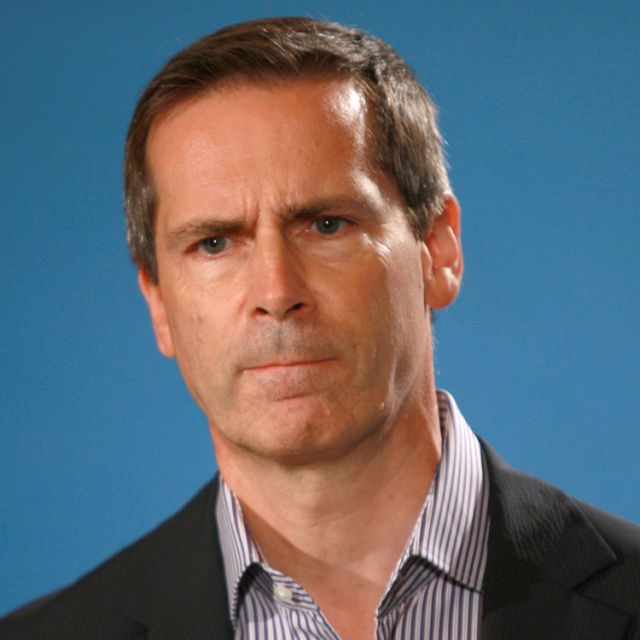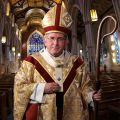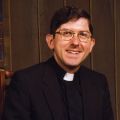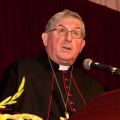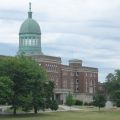Ontario's teachers, trustees brace for cuts after Drummond report
By Michael Swan, The Catholic RegisterTORONTO - Full-day kindergarten may be off limits to the Drummond chainsaw, but Ontario’s Catholic schools are still bracing for a lean season.
The Drummond Commission On the Reform of Ontario’s Public Services was commissioned by Premier Dalton McGuinty and released Feb. 15. In it, TD Bank chief economist Don Drummond recommends dozens of cuts to education funding. That’s never good news for Catholic schools, said Paul Whitehead, Ontario Catholic School Trustees’ Association senior policy advisor for finance. Less money means less flexibility for school boards.
London Catholic board seeking input on values, mission
By Evan Boudreau, The Catholic RegisterThe London District Catholic School Board will be holding an input session Feb. 29 allowing community members a voice on the values, vision and mission of the Catholic education system.
“We thought the best way to see if we are on track was to go back to our various constituencies and let them tell us how they think we are doing,” said Philip Squire, chair of the London Catholic board. “The challenge will be to talk to people about expectation versus what reality is.”
Fasting: time for a fresh look?
By Fr. Tom Ryan, Catholic Register SpecialMore people are practising voluntary fasting than you would ever guess. There is a slow-growing, new awakening to an ancient practice that is cutting across all societal lines and claiming followers from every sector of human experience. Athletes. Secretaries. Store managers. Students. Teachers.
Why are they fasting? Body ecology is often a factor. Many people fast to simply give their physical self a rest, a holiday. The body is constantly absorbed in the work of digesting food, metabolizing it into energy and eliminating the waste materials. To go without eating from time to time is to reward our bodies with the same kind of down-day that we give our minds after we’ve been working hard at reading or writing. Fasting gives the body a chance to renew itself, to burn its rubbish and eliminate accumulated toxins. It’s like a house-cleaning day.
The poor will not be denied the Lenten experience
By Michael Swan, The Catholic RegisterTORONTO - When Fr. Roger Brennan was living and working in a dirt-poor town 700 kms southwest of Manila in the Philippines, he didn’t think he would have to answer questions about whether it was OK to eat chicken during Lent. As far as he could see, his parishioners in Hinunangan were too poor to pass up any opportunity for a little extra protein, no matter what time of year it happens to be.
“Let’s face it, they fasted 12 months of the year,” Brennan, a Scarboro Missions priest, said.
Betting on Haiti’s next generation
By Michael Swan, The Catholic RegisterThere are several revolutions going on in post-earthquake Haiti and one of them is changing how Canada’s Catholic development agency thinks about its work.
Prior to the January 2010 earthquake, the Canadian Catholic Organization for Development and Peace’s core development work had always been long-term. Agreements with partner agencies usually spanning four or five years, with some partner relationships that have extended over 20 years.
Now the problems in Haiti have Development and Peace thinking in terms of generations.
Catholic press combining old, new forms of media to educate, evangelize
By Liz O'Connor Catholic News ServiceLEVITTOWN, Pa. - The Catholic press in the United States and Canada is working to fulfill its mission of informing, educating and evangelizing Catholics by continuing to publish strong print publications while increasing their use of other media.
More and more people want their news and feature articles available in more ways, at more frequent intervals, editors agreed as they spoke of websites, electronic book platforms, podcasts and mobile apps.
From humble beginnings Collins will rise to cardinal
By Michael Swan, The Catholic RegisterDespite its grand Catholic church at the top of the hill, Guelph, Ont., is a modest place and home to modest people.
A little bit of Guelph’s heroic modesty lurks in the tabernacle of Our Lady Immaculate Church up on the hill. Somehow in the 1970s the tabernacle door was damaged such that it no longer locked. It was replaced by a more modern tabernacle that some in the parish thought conflicted with their church’s neogothic architecture.
“It was an ugly, monstrous looking thing,” declares John Valeriote, lawyer, amateur historian and stalwart of Guelph’s Catholic community.
Honour recognizes gifts of Toronto Catholics [Cardinal-designate Collins Q&A]
By Catholic Register StaffCardinal-designate Thomas Collins will be elevated to the College of Cardinals by the Pope at a Vatican ceremony on Feb. 18. Amid a busy schedule as he prepares for that important event, he took time to speak directly to the readers of The Catholic Register by answering a set of prepared questions.
What has your life been like since the announcement on Jan. 6 in terms of public reaction and demands on your time?
In many ways, my daily life hasn’t changed since the Holy Father announced my appointment to the College of Cardinals. My schedule remains as busy as ever, serving the people of the archdiocese of Toronto. Of course, there has been some time involved in preparing for the consistory on Feb. 18, but nothing too onerous.
Timeline - The path taken on the road to the College of Cardinals
By Catholic Register StaffThomas Christopher Collins
o Born in Guelph, Ont., Jan. 16, 1947
o Obtained a Bachelor of Arts (English) from St. Jerome’s College in Waterloo, Ont., 1969
o Ordained to the diaconate, May 14, 1972
Thomas Collins - A scholar priest
By Catholic Register StaffThomas Collins began his education in St. Stanislaw’s School in the shadow of Our Lady Immaculate Church in Guelph. High school was just across the way at Bishop Macdonell High School. At every stage, it has been a thoroughly Catholic education.
Collins busy beyond duties as archbishop of Toronto
By Catholic Register Staffo Member of Canadian Conference of Catholic Bishops’ Permanent Council
o Chancellor, University of St. Michael’s College, University of Toronto
o Chancellor, Pontifical Institute of Medieval Studies, Toronto

